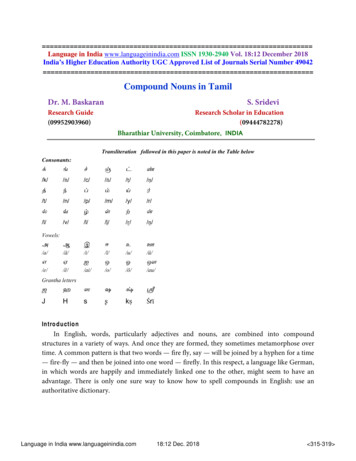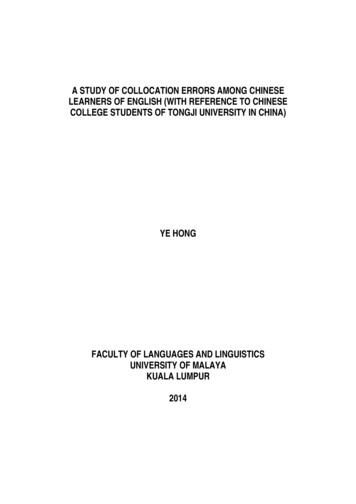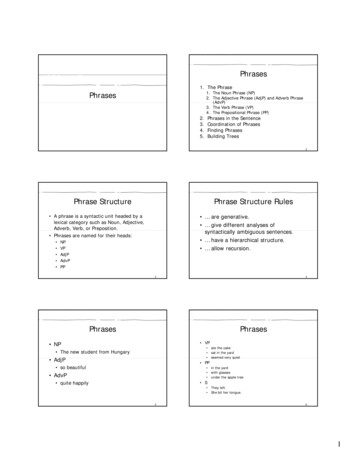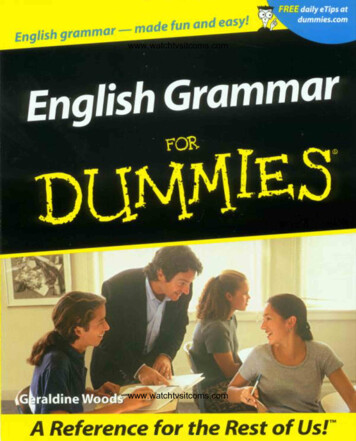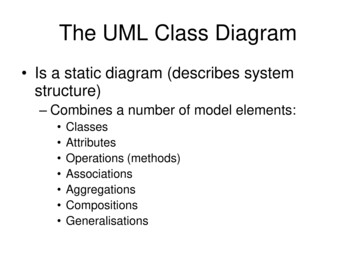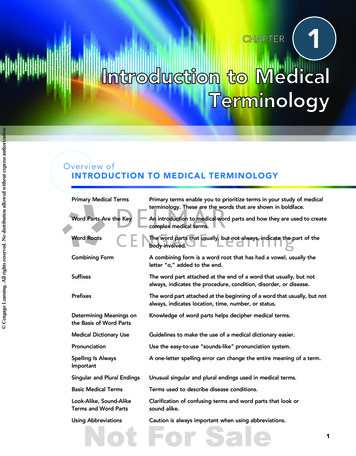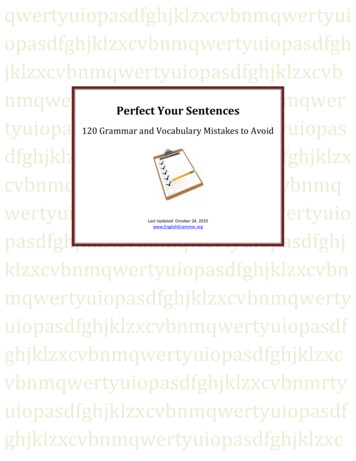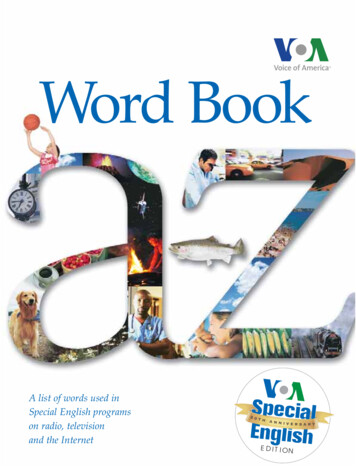
Transcription
Mag. Philippa Maurer-StrohTowards a Bilingual Adjective-Noun CollocationDictionary of English and GermanDISSERTATIONzur Erlangung des akademischen GradesDoktorin der PhilosophieUniversität KlagenfurtFakultät für Kulturwissenschaften1. Begutachter: Univ.-Prof. Dr. Allan R. JamesInstitut: Anglistik und Amerikanistik2. Begutachter: Univ.-Prof. Dr. Dusan Gabrovsek (Universität Ljubljana, Slowenien)Institut: Anglistik und Amerikanistik, Fakultät für KulturwissenschaftenKlagenfurt, Dezember 2004
EHRENWÖRTLICHE ERKLÄRUNGIch erkläre ehrenwörtlich, dass ich die vorliegende Schrift verfasst und die mit ihrunmittelbar verbundenen Arbeiten selbst durchgeführt habe. Die in der Schriftverwendete Literatur sowie das Ausmaß der mir im Arbeitsvorgang gewährtenUnterstützung sind ausnahmslos angegeben. Die Schrift ist noch keiner anderenPrüfungsbehörde vorgelegt worden.Klagenfurt, am 15. Dezember 2004
Towards a Bilingual Adjective-Noun CollocationDictionary of English and GermanbyMag. Philippa Maurer-StrohA Doctoral Thesis Submitted to theFACULTY OF ARTSUNIVERSITY OF KLAGENFURTIn Partial Fulfilment of the Requirements for the DegreeDoctor philosophiaeAt the Institute for English and American StudiesSupervisor: Univ.-Prof. Dr. Allan R. JamesCo-Supervisor: Univ.-Prof. Dr. Dusan Gabrovsek (University of Ljubljana, Slovenia)Klagenfurt, December 2004
To my late grandmothers,Christi Balling-Strohf Sept 2003andEva-Maria Rahmf Jan 2004
Towards a Bilingual Adjective-Noun CollocationDictionary of English and GermanAbstract (English):Collocations are recurrent, usage- rather than semantically based word combinations.The fact that they are largely language-specific - even with respect to languages asclosely related as German and English - suggests the need for a bilingual collocationdictionary. This need is proven by analysing a representative selection ofcomprehensive present-day general bilingual dictionaries as well as by evaluatingoutputs from machine translation tools, both online and commercial. The doctoral thesisstarts with an outline of the different concepts, methods, sources and applications asregards collocations in both the contemporary and historical perspectives. Next,collocations are discussed in the contrastive (English-German) light. Before embarkingon the discussion of the methods I have tested with a view to compiling such anEnglish-German adjective-noun dictionary, I outline the main principles of bilinguallexicography at large. By way of conclusion, the applicability of such a dictionary istested along with the hypothesis as to the expansion possibility of the adjective-noundictionary to other collocational structures.Abstract (German):Kollokationen sind wiederholte, usuelle Wortkombinationen, deren Zusammensetzungsich meist nicht semantisch begründen lässt, sondern vielmehr lexikalischen undkonventionalisierten Ursprungs ist. Kollokationen sind zudem größtenteilssprachenspezifisch, und auch ein engverwandtes Sprachenpaar wie das Deutsche unddas Englische weist eine Vielzahl an semantischen und strukturellen Unterschieden auf.Anhand von Wörterbuchanalysen und Übersetzungsmaschinen (online oderkommerziell) wird die Notwendigkeit eines zweisprachigen Kollokationswörterbuchsdeutlich gemacht. Zunächst werden die unterschiedlichen Begriffe, Methoden, Quellenund Anwendungen der Kollokationsforschung in historischer und zeitgenössischerPerspektive umrissen, darauf folgt eine Abhandlung über Kollokationen imSprachenvergleich (Englisch-Deutsch). Danach werden die Grundlagen derzweisprachigen Lexikographie erläutert, bevor im Hauptteil der Arbeit auf dieverschiedenen Methoden zur Erstellung eines Englisch-Deutschen Adjektiv-NomenKollokationswörterbuchs näher eingegangen wird. Abschließend wird dieAnwendbarkeit eines solchen Wörterbuchs diskutiert und dessen Erweiterung aufandere Kollokationsstrukturen besprochen.Philippa Maurer-Stroh
PREFACEI occasionally work as a freelance translator. Whilst undertaking translation work, Ihave put in many hours of unnecessary work trying to find the correct equivalent of amulti-word unit. Having checked various bilingual and general monolingual dictionariesas well as monolingual collocation dictionaries and being finally convinced that mychoice of a word combination is perfectly fine, it may nevertheless seem odd to a nativespeaker. Having a degree in English Studies and making extensive use of existingdictionaries is obviously not enough to know which words go together.Accordingly, the aim of my thesis is to present an appropriate method of compiling abilingual dictionary specialised on collocations.Language cannot be invented; it can only be captured.(John McH. Sinclair)
11ACKNOWLEDGEMENTSI have been riveted on dictionaries and phrases ever since I was first introduced todictionaries by a former English teacher of mine, way back in 1988, and I would like tothank my two supervisors, Univ. Prof. Allan James and Univ. Prof. Dusan Gabrovsekfor greatly encouraging me with their support to engage in lexicography andphraseology - and, naturally, for supervising this doctoral thesis.I would like to sincerely thank Professor James not only for introducing me tolinguistics in general but also for finding me the best possible second supervisor ever.Apart from being my most valuable academic source concerning dictionaries andphraseology (and linguistics in general), Professor Gabrovsek is even more enthusiasticabout dictionaries and phrases than I am - and if we had been able to do so, we wouldhave spent (more) hours (in bookstores) indulging in "dictionariesms" and"collcoations". LEXICOGRAPHY & PHRASEOLOGY GALORE -as Prof.Gabrovsek would say. I am deeply grateful to him for being there for me (in person, email, phone and MS Messenger) whenever problems occurred or there was a danger of"losing track". Also, I would like to thank him for helpful hints on and making availableto me most of the literature on my topic. Finally, Prof. Gabrovsek provided me with themental support I needed and without which I would never have finished this thesis.Thank you from the bottom of my heart!Right after my graduation, Professor James made me aware of a number of relevantcourses, workshops and other events to participate in. Without these hints I would nothave been able to gain from the expertise of John Sinclair, Elena Tognini-Bonelli,Goran Kjellmer, Patrick Hanks, Sue Atkins, Adam Kilgarriff, Mike Rundell, PeraillaDanielsson and Frank Müller.At this point I wish to express my sincere gratitude to the STUDIENREKTORAT at theUniversity of Klagenfurt. It was their grant that made my participation in these coursespossible. Additionally, I was able to use the grant for my journeys to Germany(Professor Michael Stubbs in Trier) and Britain (Professor Wolfgang Teubert inBirmingham).
mI would like to thank Mike Stubbs for initiating me into corpus linguistics, forsupporting me with advice and for inviting me to Trier to get to know the university andfor hands-on sessions on various computer programs.Prof. Teubert is a valuable contact as regards (contrastive) corpus linguistics andphraseology; he has ever since supported me wholeheartedly and I wish to personallythank him for that.Furthermore, I would like to thank Ao. Univ. Prof. Günther Fliedl for his support. Hisenthusiasm and readiness to help were a driving force in setting up a project ofinternational dimensions from a "small" computer program. Especially, I am deeplygrateful to my brother Sebastian. He was the one who wrote that initial program - andset the ball rolling. Also, I wish to express my thanks to Ingrid Fernandez de Retana,Andreas Homa, Werner Sühs and Georg Weber, all members of the team.With sadness, I wish to acknowledge the support of one of my deceased teachers, Ao.Univ. Prof. Hans Köberl. His translation courses were intriguing and illuminating. Iwish I could have learned more from him concerning contrastive phraseology.Researchers and professionals from other institutions also helped me gain betterunderstanding of the subject or introduced me to specialist colleagues: Philipp Koehn,Cambridge (MA); Ann Lawson, Oxford University Press; Oliver Mason, BirminghamUniversity; Matthias Richter, Leipzig University; Olaf Thyen, Duden-Redaktion,Mannheim.I would like to thank all my close friends - Michael Dabringer, Ingrid Fernandez deRetana, Karolin Knoch, Daniel Koban, Philipp Loebell, Lotte Maurer, NikolausNeubauer, Philipp Nicolelli-Fulgenzi, Johannes Pagitz and Ursula Zager, in particular for their support and help.Finally, in the most private sphere of acknowledgements, Mum, Dad, Johnny, Basti andFernanda, you are the best. Thank you for making all this possible! We all know that thesituation is not easy, but together we can handle more than that!
IVTABLE OF List of FiguresixList of Tablesxii1. Introduction11.1. An Adjective-Noun Collocation Dictionary11.2. A Bilingual Adjective-Noun Collocation Dictionary21.3. The Need for a Bilingual Collocation Dictionary51.4. What Should an English-German Adjective-NounCollocation Dictionary Look Like?81.5. Monolingual Collocation Dictionaries vs. BilingualCollocation Dictionaries1.6. Outline of the Chapters2. Collocation: Concepts, Sources and Methods1113142.1. Different Approaches, Interpretations and Applications of theConcept of Collocation152.2.1.The Pedagogical Approach to Collocations162.2.2.The Russian Phraseological Approach to Collocations162.2.3.The Phraseological Approach to Collocations172.2.4.The Lexicographical Approach to Collocations192.2.5.The Linguistic (Frequency-Based) Approach to2.2.6.Collocations22The Computational Approach to Collocations242.3. Collocations in Phraseology26
2.3.1.Collocations vs. Free Combinations282.3.2.Collocations vs. Idioms302.3.3.Collocations vs. Compounds312.3.4.The Phraseological Cline332.3.5.Collocations in Other Linguistic Branches342.4. Collocations and Corpus 4.3.Parsing372.4.4.Corpus Linguistics, Collocations and Areas ofApplication2.5. Collocations in Computational Linguistics3. Contrastivity3843463.1. Predictable and Structurally Congruent Combinations473.2. Predictable and Structurally Incongruent Combinations483.3. Unpredictable and Structurally Congruent Combinations493.4. Unpredictable and Structurally Incongruent Combinations503.5. Case Studies513.5.1.English Collocations and Their Translations inBilingual Dictionaries3.5.2.51English and German Adjective-NounCombinations and Machine Translation4. Collocations and the Dictionary4.1. Monolingual Collocation Dictionaries5459654.1.1.English Monolingual Collocation Dictionaries: General664.1.2.English Monolingual Collocation Dictionaries: Specialised754.2. Bilingual Collocation Dictionaries80
VI4.2.1.Collocation Dictionaries of English and German854.2.2.Proposals for Bilingual Collocation Dictionaries884.3. Bilingual Lexicography with a Special Focus on English andGerman904.3.1.Principles of Bilingual Lexicography904.3.2.Collocations and Bilingual Lexicography994.4. Towards a Bilingual Adjective-Noun Collocation Dictionary ofEnglish and German1065. Methods of Compiling an Adjective-Noun Collocation Dictionaryof English and German1075.1. The Corpus-Driven Approach1135.1.1.ANCR - The Purely Statistical Approach5.2. The Corpus-Based Approach1221286. Further Implications and Conclusions1377. References and Bibliography141APPENDICES161Appendix A — Corpus Linguistics162(1) General162(2) Corpus Software - Download and Online Use164Appendix B - Online Machine Translation Tools170Appendix C - Parallel Test Corpus171(1) Text Version of the Corpus171(2) A ligned and A nnotated Parallel Corpus172Appendix D - A Sample of an English-German Adjective-Noun CollocationDictionary177
VilABBREVIATIONSADJadjectiveALTDAdvanced Learner's Trilingual Lexicon. Dictionnaire thématiqueanglais-français-allemand. Politique-Economie-Expression dutemps et de la quantification, 1997ANCRAdjective-Noun Collocation RetrieverARCSAdvanced Readers ' Collocation Searcher, 1997BBIBBI Dictionary of English Word Combinations, 1997CALDCambridge Advanced Learner's Dictionary, 2003COBCOLLCollins COBUILD Collocations on CD-ROM, 1995COBUILDCollins COBUILD English Language Dictionary, 1987COBUILD-CDCOBUILD on CD-ROM, onaryUnabridged, 1999COLLINS-ECollins e-Großwörterbuch Englisch 4.0, 2004DAADictionary of Appropriate Adjectives, 1994DECA Dictionary of English Collocations, 1990DEWCDictionary of English Words in Context, istianHemetsberger. Available at http://www.dict.ee [10/12/2004]Duden Oxford Großwörterbuch Englisch: Deutsch-Englisch,DUOXEnglisch-Deutsch, 1999Duden Oxford Großwörterbuch Englisch on CD-ROM [PC-DUOX-EBibliothek 2001], 1999DUSTDuden - Das Stilwörterbuch, 2001ESPEnglish for Specific Purposesfig-figurativeGEWA Grammar of English Words, 1938HWheadwordISEDIdiomatic and Syntactic English Dictionary, 1942KDECThe Kenkyusha Dictionary of English Collocations, 1995Llnative language
VlllL2foreign languageLANGELangenscheidts Handwörterbuch Englisch, 2001LDOCELongman Dictionary of Contemporary English, 2003LEOEnglish/German Online Dictionary by the TU Munich. Availableat http://dict.leo.org/ [10/12/2004]lit.literallit. trans.literal translationLTPLTP Dictionary of Selected Collocations, 1997MACMacmillan English Dictionary for Advanced Learners, 2002MWMerriam Webster's Collegiate Dictionary, 2003NnounNOADThe New Oxford American Dictionary on CD-ROM, 2001NVELENoun-Verb Expressions in Legal English, 1975OALDOxford Advanced Learner's Dictionary of Current English, 2000OCDOxford Collocations Dictionary for Students of English, 2002ODEOxford Dictionary of English, 2003OEDOxford English Dictionary, 1989PIEPhrasesinEnglishbyWilliamFletcher.Available athttp://pie.usna.edu/ [10/12/2004]PONSPONS Wörterbuch für Schule und Studium Englisch-Deutsch,2003POSpart of speechRDWFRoget's Descriptive Word Finder, 2003RECDHBA Russian-English Collocational Dictionary of the Human Body,1996REDVCRussian-English Dictionary of Verbal Collocations, 1993RHThe Random House Dictionary of the English Language, 1987SLsource language (primarily when dealing with translation studies)TLtarget language (primarily when dealing with translation studies)WNWWebster's New World Collegiate Dictionary, 2002
IXLIST OF FIGURESFig. 1:Semantic and structural differences between English and Germanadjective-noun collocationsFig. 2:A sample entry from an English-German adjective-noun collocationdictionary (1)Fig. 3:A sample entry from an English-German adjective-noun collocationdictionary (2)Fig. 4:Examples of the English on a . basis pattern and its German translationequivalentsFig. 5a:The entry for comparison in the English-German adjective-nouncollocation dictionaryFig. 5b:The entry for comparison translated from OCDFig. 5c:The entry for comparison translated from LTPFig. 5c:The entry for comparison translated from BBIFig. 6:Semantic tailoringFig. 7:Collocation vs. idiomFig. 8:The treatment offoregone conclusion in the English-German adjectivenoun collocation dictionaryFig. 9:Concordance of the noun hauntFig. 10:Example of a tagged textFig. 11 :Example of a parsed sentenceFig. 12:Concordance of phone call*Fig. 13:Parallel concordance of winterFig. 14:Examples of predictable and structurally incongruent combinations andtheir treatment in the English-German adjective-noun collocationdictionaryFig. 15:Categories of correct translation of all five MT toolsFig. 16:Sample page from GEWFig. 17:Sample page from DEWCFig. 18:Sample page from BBIFig. 19a:COBCOLL - first stepFig. 19b:COBCOLL - second step
Fig. 19c:COBCOLL - stopwordsFig. 19d:COBCOLL - KWIC concordanceFig. 19e:COBCOLL - expanded example & source of the collocationFig. 20:Sample page from LTPFig. 21 :Sample entry form OCDFig. 22:Sample page from DUSTFig. 23 :Sample from NVELEFig. 24:Sample entries from DAAFig. 25:Sample category from RDWFFig: 26:Sample entries from DECFig. 27:Sample page from REDVCFig. 28:Extract from KDECFig. 29:Extract from RECDHBFig. 30:Screenshot of an ARCS sample entryFig. 31 :Extract from ALTDFig. 32:Active vs. passive dictionariesFig. 33:Bi-directional and bi-functional dictionariesFig. 34:Hausmann's typology of bilingual dictionariesFig. 35:The entry for sample in the English-German adjective-noun collocationdictionaryFig. 36:Sample index of the adjective-noun collocation dictionaryFig. 37:The semasiological approach to collocations in encoding and decodingentriesFig. 38:The onomasiological approach to collocations in encoding entriesFig. 39:An example of decoding convergence (En-De)Fig. 40:An example of encoding divergence (De-En)Fig. 41:Graphical user interfaceof ancollocation dictionaryFig. 42:Sentence alignment and tokenisingFig. 43:LemmatisingFig. 44:TaggingFig. 45:Parallel concordance of rainFig. 46:ANCR - Calling up componentsFig. 47 :ANCR - AlignerEnglish-Germanadjective-noun
XIFig. 48:ANCR - Starting the corpus analysisFig. 49:ANCR - Search for the English noun basisFig. 50:Adjective-noun collocations from ANCRFig. 51 :Corpus-driven entry for discoveryFig. 52a:Corpus-based entry for discoveryFig. 52b:Corpus-driven entry for discoveryFig. 53:The entry for sample in an English-German adjective-noun collocationdictionaryFig. 54a:The corpus-based entry for remedyFig. 54b:The entry for remedy based on COLLINS-E and DUOX-E
XllLIST OF TABLESTable 1 :Adjective noun structures and headword policies as regards foregoneconclusionTable 2 :Results of the bilingual extraction of word pairsTable 3:English collocations and their distribution in English-German generalbilingual dictionariesTable 4:Inclusion policy of contrastive collocation categories in present-daybilingual dictionariesTable 5:The compilation material for the noun sampleTable 6:Possible reasons for inclusion and exclusion
Towards a Bilingual Adjective-Noun CollocationDictionary of English and German1. IntroductionWhen people from non-linguistic backgrounds ask me about the subject of my researchand I tell them that I compile a bilingual dictionary of adjective-noun collocations, it isnothing unusual for me to get puzzled looks - what is a collocation? In a nutshell, I willsay, a collocation can be defined as a typical co-occurrence of words. However, eventhis straightforward definition usually does not mean a thing to my conversationpartners. Only when I illustrate the term collocation by using M.A.K. Halliday's (1966:150) famous example and make them aware of the fact that the German adjective-nouncombination starker Tee should be rendered into English as strong tea rather thanpowerful tea - although both powerful and strong are translation equivalents of theGerman stark - will they realise what I mean by the term collocation. Typically, theywill agree that a bilingual collocation dictionary is a useful tool to enhance their skills ina foreign language.1.1. An Adjective-Noun Collocation DictionaryFor lexicographical purposes in particular, collocations are normally divided into twocategories: grammatical and lexical collocations (Benson et al. 1997: ix).Grammatical collocations consist of a dominant (content) word, i.e. an adjective, a nounor a verb, and a preposition or a grammatical construction such as a clause or aninfinitive. Grammatical collocations are, for example, (to be) attracted to, (it is)delightful to infinitive, (to have) an interest in (something), (it is) a myth that clause and to vote against (someone/something).
Lexical collocations, on the other hand, consist of two content words and typicallyreveal the following structures:(1) adjective nounaddled eggs, blithering idiot, heavy smoker, sheer folly(2) noun verb(a) disaster strikes, negotiations collapse, prices fall(3) verb nounyou commit a crime, you give a lecture, you impose taxes(4) verb adverbyou deeply meditate, you defend something vigorously(5) adverb adjectivereadily available, perfectly capable, utterly absorbedIn English, nouns are often used attributively, i.e. pre-modifying another noun, and canthus be treated as adjectives, e.g. book review and cough remedy.Given the fact that up to 80% of the words in discourse (spoken and written) are chosenaccording to the co-selection principle rather than to purely syntagmatic andgrammatical factors (Sinclair 2000: 197), and that adjective-noun collocations areamong the most common realisations of this lexical co-selection principle, the mainfocus of this thesis is on the analysis of adjective-noun combinations and combinationsof attributively used nouns premodifiying other nouns within the wider framework ofphraseology, in order to develop a methodology for the compilation of a specialisedcollocation dictionary.1.2. A Bilingual Adjective-Noun Collocation DictionaryIn both the relevant literature and lexicographical practice, the concept of collocation isstill obscured by its numerous interpretations and varying terminology. The Englishlanguage alone has more than 50 terms that can, in the broadest sense, be defined as'typical co-occurrence of words' (cf. Wray and Perkins 2000: 3 and Cowie 1988: 7). Iwill give a brief overview of these in chapter 2 and delimit how I see collocations in thelight of my specialised bilingual collocation dictionary.With regard to this 'babel' it is, indeed, difficult to fulfil the expectations of each'school of collocation' when writing a collocation dictionary, whether adjective-noun or
general, and this is certainly epitomised in the compilation of a bilingual collocationdictionary, specialised or not.First of all, what kind of information will the user of a bilingual collocation dictionaryof adjective-noun collocations expect to retrieve?To begin with, many collocations are language-specific and, consequently, collocationalpatterns are different across language pairs. Even languages as closely related asEnglish and German reveal considerable semantic and structural differences in theiradjective-noun collocational patterning, as Fig. 1 clearly shows.EnglishGermanred-hot / odds-on favouritehaushoher Favorit(lit. trans, house-high favourite)heavy smokerstarker Raucher(lit. trans, strong smoker)(the patient is) in a critical conditionder Zustand des Patienten ist kritisch(lit. trans, the condition of. is critical)der Patient schwebt in Lebensgefahr(lit. trans, the . floats in danger of his life)to be employed as a teacher of Frenchals Teilzeitlehrer(in) für Französischon a part-time basisangestellt sein(lit. trans, angestellt sein als Lehrer(in) fürFranzösisch auf Teilzeit-Basis)Fig. 1 : Semantic and structural differences between English and German adjective-noun collocationsSecond, in the contrastive framework, collocations have to be looked at from twodifferent angles, i.e. decoding and encoding. Decoding a collocation means tocomprehend a foreign-language (hereafter L2) collocation or translate it into one'snative language (henceforth LI). Encoding a collocation means to produce an L2collocation or to translate an LI collocation into an L2.
Generally speaking, collocations do not cause many problems in the decoding process,as long as the two words that make up the collocation are known to the speaker orwriter. The encoding process, however, can cause a lot of difficulties since speakers, indealing with collocations, tend to rely on the hypothesis of transferability (Bahns 1993:61), i.e. they take the LI collocation and translate it word-by-word with the translationequivalents that spring to their minds most readily. The errors, consequently, are due toLI interference. And it is particularly at the post-intermediate and advanced levels oflearning a foreign language, i.e. the stages when the learners start creative writing, thatthese weaknesses come to the fore.Collocations are passwords to native-like fluency in a foreign language (Cop 1991:2776), and although an erroneous collocation may be still understood by the nativespeaker, it might cause laughter or even annoyance. Collocational errors should thus beminimised in translation and advanced writing in particular. This is why advancedlearners and translators are the main target user groups of a collocation dictionary.Research has shown that, in spite of the recent developments in monolingual learners'dictionaries (of English in particular), translators and learners still consult their bilingualdictionaries first before turning to the monolingual ones (for reassurance or becausethey were not able to find the information they needed in the bilingual dictionary). Thisand the fact that there are only few collocation dictionaries available in any language,monolingual or bilingual, justify my efforts to compile a bilingual collocationdictionary.Since I am a learner of English and a native speaker of German, it would be obvious tomake an encoding dictionary for German learners of English; however, in thecompilation process, in the absence of an English native speaker, the best possiblealternative is for me as the lexicographer to encode into my mother tongue, German,although this, but only at first sight, creates a somewhat artificial situation.The result of this thesis will therefore be an adjective-noun collocation dictionary forthe English user encoding into German. In essence, the dictionary will bemonodirectional and monofunctional however, an index of German nouns in the backmatter of the dictionary will make it useful also for the German speaker.
1.3. The Need for a Bilingual Collocation DictionaryAs mentioned in 1.2., users, particularly in the encoding process, still tend to first usebilingual dictionaries before they refer to monolingual ones. But how good are bilingualdictionaries when it comes to their provision of collocations?In a recent paper of mine (Maurer-Stroh 2004b) I tested the four major comprehensivebilingual dictionaries of English and German: Duden Oxford Großwörterbuch Englisch:Deutsch-Englisch, Englisch-Deutsch (hereafter DUOX), Collins German-English,English-German Dictionary Unabridged (COGER), PONS Wörterbuch für Schule undStudium Englisch-Deutsch (PONS) and Langenscheidts Handwörterbuch Englisch(LANGE). With the help of these dictionaries, in my case study, I tried to translate 38German adjective-noun collocations into English. The best result was achieved by usingCOGER, though this also only helped me translate 84% of the collocations in question.Another test of mine using these four bilingual dictionaries was to translate 29 Englishadjective-noun collocations into German (Maurer-Stroh 2004c). The best result wasonly 79.3%.Moreover, even if the collocation is in the dictionary, this does not mean that it will beeasy to find. Bilingual dictionaries still lack a shared policy as to where they listadjective-noun collocations, i.e. under the adjective or under the noun.Let us make an experiment. How many look-ups do the collocations a poor comparisonand afar-fetched comparison need in DUOX, for example?(I) poor comparison(a) you will not find the collocation in the entry for comparison(b) the entry for poor does not explicitly list the combination either(c) the next best thing would be to search the German translation of comparisonsince this noun is less polysemous than the adjective poor and, consequently, theentry to browse is simpler; and, indeed poor comparison can be found in theentry for Vergleich
(2) far-fetched comparison(a) the collocation is nor explicitly listed in the entry for comparison(b) nor is it listed in the entry fox far-fetched(c) the entry for the German equivalent Vergleich does not contain the collocationeither(d) as a next step we try to look for the collocation in the entry for the Germantranslation equivalent of far-fetched, which is weit hergeholt; strangely, we donot find an entry for weit hergeholt(e) we do not find the collocation in the entry for weit either(f) in the entry for herholen (the infinitive of hergeholt) we eventually find weithergeholt and its translation equivalent far-fetched; still, the collocation is notexplicitly stated anywhere in the dictionaryWhile poor comparison needs three look-ups, not even a six-step look-up process inDUOX gives you the German translation of far-fetched comparison.Electronic advances have made it possible to convert print dictionaries into machinereadable databases and thus create electronic dictionaries on CD-ROM, which allow forfull-text search in all entries. However, even in using the electronic version of DUOX,the translation of poor comparison needs three look-ups for successful retrieval sincethe full-text search lists three entries in which poor and comparison are included, notnecessarily as a collocation though, and maybe scattered across the whole entry.However, the search for a translation equivalent of far-fetched comparison is highlyfacilitated with the help of the full-text search. Only one look-up is needed to find outthat the German translation of the adjective in far-fetched comparison is gesucht.However, the exact collocation is not listed in its translation and the user would have tosearch for the German translation of comparison in another, second, look-up.Yet, also with the full-text search tool in the CD-ROM version of DUOX you wouldsearch in vain for the collocation apt comparison.A bilingual adjective-noun collocation dictionary would remedy this dilemma, as youcan see in Fig. 2.
comparisonappropriate schlagender / sehr überzeugender Vergleich apt passender / treffender Vergleich dose eingehender /genauer Vergleich detailed detaillierter / eingehenderVergleich direct direkter Vergleich fair fairer / gerechterVergleich far-fetched gesuchter / gekünstelter /weithergeholterVergleich favourablevorteilhafteGegenüberstellung, vorteilhafter Vergleich good guterVergleich inept ungeeigneter / unangemessener /unpas
1.1. An Adjective-Noun Collocation Dictionary 1 1.2. A Bilingual Adjective-Noun Collocation Dictionary 2 1.3. The Need for a Bilingual Collocation Dictionary 5 1.4. What Should an English-German Adjective-Noun Collocation Dictionary Look Like? 8 1.5. Monolingual Collocation Dictionaries vs. Bilingual Collocation Dictionaries 11 1.6. Outline of .
